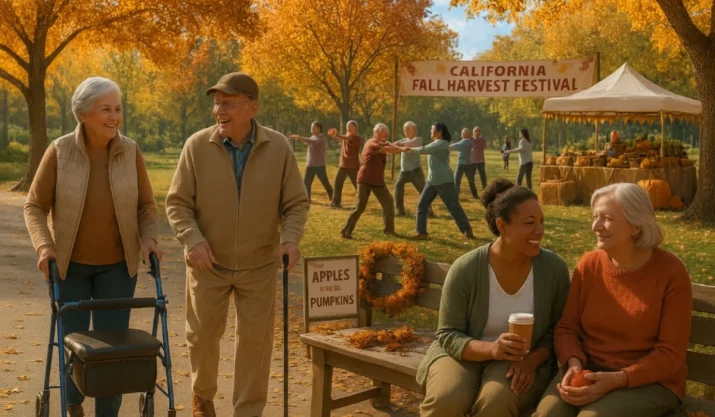Grandparents Role With Grandchildren: Staying Close When Mobility Changes

Table of Contents
For many California families, grandparents play an important role that goes far beyond babysitting. They’re mentors, role models, and the heart of the extended family. Whether you’re a grandpa who loves fishing trips or a grandmother who keeps family history alive through stories, your life experience enriches the lives of your grandchildren in unique ways.
But when mobility changes, even everyday activities like walks in the park or family dinners can feel more complicated. Aging and shifts in physical health don’t erase your impact. They simply reshape it.
This guide shows how grandparents today can maintain a close relationship with grandkids, adapt to caregiving changes, and create safe, welcoming spaces to continue spending time together.
Key Takeaways
- The role of grandparents is about guidance, care, and emotional support.
- Staying close to grandkids through conversation, video calls, and shared routines strengthens family relationships.
- Home upgrades such as ramps, stair lifts, and home lifts can reduce everyday strain and make visits easier and safer.
- Mentoring and storytelling foster self-esteem and lifelong values for the children’s lives you help shape.
Staying “You” as a Grandparent
As older adults, you may feel that your sense of identity shifts as your mobility changes. But remember, the role of grandparents is grounded in connection, not activity level.
Your love, wisdom, and emotional support can positively influence your grandchildren’s confidence and emotional well-being through early childhood and adolescence.
The Storyteller
Your stories help preserve family history and can support a sense of connection and emotional well-being. Sharing memories about your own parents or what life was like when your adult children were young brings generations together.
These conversations can help young children understand where they come from and feel connected to their family’s history.
Whether you’re telling bedtime stories to a five-year-old or sharing old photos with a teenager, your words help build self-esteem and belonging.
The Mentor
Grandparents play an ongoing mentoring role during adolescence, when kids often need a steady voice outside their parents.
You can use your life lessons—from patience to problem-solving—to help grandkids navigate challenges. By offering guidance instead of judgment, you show them how resilience and kindness work in real life.
Grandparents are mentors who teach through example, not perfection.
The Caregiver
Some grandparents serve as full-time or part-time caregivers or step in as primary caregivers for grandchildren. Even when caregiving feels more challenging, small changes can help.
Reading together, teaching a simple recipe, or helping with homework from your favorite chair keeps you involved without overexertion. Your unconditional love and steady presence are what your own children remember most.
Staying Close With Grandchildren, Even When Mobility Changes
Maintaining a close relationship thrives on consistency and affection. When you focus on shared time, emotional support, and communication, the grandparent-grandchild relationship remains strong no matter your mobility level.
The Weekly Ritual
A simple, recurring routine gives grandchildren a sense of security.
Maybe it’s Saturday pancakes, a video chat after school, or helping your 10-year-old grandson practice his spelling words. Predictable rituals can strengthen family relationships and help kids learn about reliability and care.
Shared Hobbies
Even if you move differently now, you can still spend time doing things you both enjoy.
Plant flowers in raised beds, organize family photos, or enjoy indoor activities together. These moments nurture child development and can help kids practice patience, teamwork, and creativity over time.
Technology as Connection
Virtual visits can be a helpful way to stay connected when you can’t be there in person. Video calls like FaceTime let you read bedtime stories, attend birthdays, or watch soccer highlights from your granddaughter’s team.
When travel is difficult, these modern childcare gestures maintain emotional closeness and remind children that your support is steady and unconditional.
Making Time Together Easier at Home and Out
California homes often have stairs, narrow doorways, or split-level layouts that can challenge mobility. A few practical adjustments can make hosting grandkids easier while protecting your physical health and safety.
At Home
Installing a stair lift or home lift helps you reach upper floors without strain. A simple ramp or handrail addition creates easier access for strollers and wheelchairs, benefiting both older adults and young children.
Rearranging furniture to maintain clear walking paths and using nonslip mats or well-placed grab bars can reduce trip-and-slip risks. These improvements can support mobility and may help your family feel more comfortable with in-home visits.
Accessibility isn’t just practical. It’s an act of caregiving that allows you to keep spending time with your grandkids comfortably.
Getting Out Together
Many California parks, beaches, and museums offer accessibility features that can make outings easier for grandparents and grandkids. Consider low-key outings like picnics or short walks, and choose routes with places to rest if needed.
The goal is to stay active while protecting your well-being.
These shared experiences can create positive memories and support a sense of family connection.
Supporting Your Physical and Mental Health
Supporting your physical health can also support your mental well-being. Low-impact exercise may help support balance and mobility, especially when a doctor or therapist says it’s appropriate for you.
Equally important, staying emotionally connected to family members can help reduce feelings of isolation. Remember, taking care of yourself is one of the most powerful life lessons you can pass along.
Plan a Safer Setup for Visits
If you want your home to remain a hub for birthdays, dinners, and playdates, consider scheduling a home accessibility consultation. It can help you identify practical upgrades that make hosting easier and safer, like ramps, stair lifts, or wider doorways.
When you adapt your space, you make it more welcoming for every generation of your extended family. With the right setup, you’ll continue to play an important role in your grandchildren’s lives, whether they’re two or twenty years old.
California Mobility helps families plan home accessibility upgrades that support comfort and independence. Our team can help you review options that fit your home layout, needs, and how your family spends time together.






